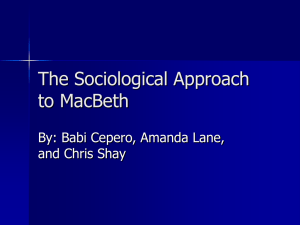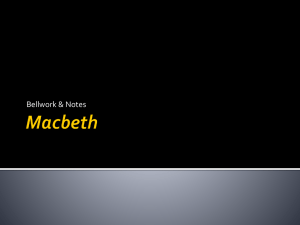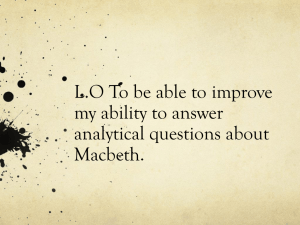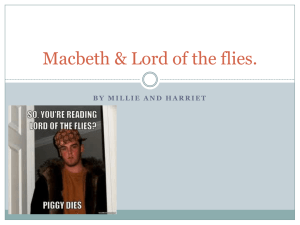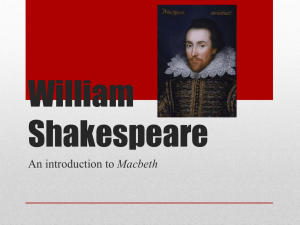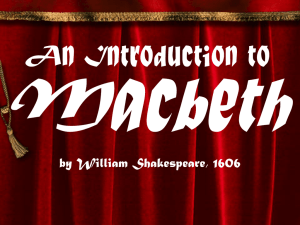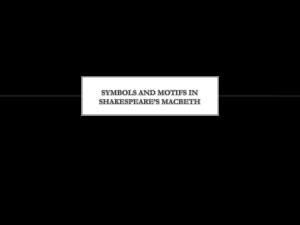Macbeth
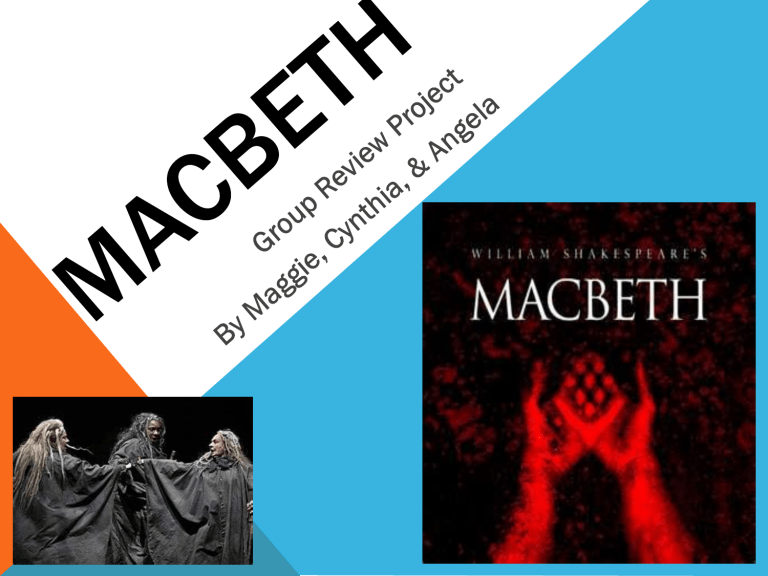
WILLIAM SHAKESPEARE
• His career was at its highest during the reins of Elizabeth I
(1558-1603) and James I
(1603-1625)
• Wrote Macbeth in 1606 during the rein of James I
• Macbeth in a Tragic Play
• This was one of
Shakespeare’s shortest and bloodiest plays.
CHARACTER OF MACBETH
• Tragic Hero
- ambition contributed to his own destruction
- was a “good” servant to the crown until meeting the three Witches
• Tragic Flaw
- becomes obsessed with the power of being king
& maintaining that power
CHARACTER OF LADY MACBETH
• Is obsessed about gaining the power.
• She the dominant one in the relationship.
- manipulates Macbeth
- questions Macbeths MANHOOD
- wants to be unemotional towards to deeds that she has planned
PASSAGE I: READING THE LETTER
o Defining the scene
In this scene, Lady Macbeth receives a letter from
Macbeth stating the occurrences with the three witches. He tells of how he will become the new king and that King Duncan will be arriving to his home. Here is where Lady Macbeth is critically analyzing how
Macbeth would be more of a feminine King. As well as she expresses her worries about Hamlet’s lack of ambition of getting the title as king.
L I N E 1 - 4
“Glamis thou art, and
Cawdor; and shalt be
/ What thou art promised: yet do I fear thy nature; / It is too full o’ the milk of human kindness / To catch the nearest way: thou wouldst be great;…”
STANZA I
A N A LY S I S
• In these lines Shakespeare’s diction such as “I fear thy nature” and “milk of human kindness” is used to illustrate
Lady Macbeth’s worry about
Macbeth being a weak person, comparing it to milk. Milk symbolizes a feminine trait and leads in how women at that time period were seen as weak individuals.
L I N E 6 - 9
“The illness should attend it: what thou wouldst highly, /
That wouldst thou holily; wouldst not play false, / And yet wouldst wrongly win: thou’ldst have, great
Glamis,…”
STANZA I
A N A LY S I S
• There is a paradox in the lines “ that wouldst thou holily; wouldst not play false” meaning if Macbeth wants to be crowned king he must play fair. At the same time Lady
Macbeth contradicts herself when she says “and yet wouldst wrongly win: thou’ldst have, great Glamis” meaning she is making an acceptation in this case by cheating to get the title of king.
STANZA III
L I N E 1 - 3
“The raven himself is hoarse / That croaks the fatal entrance of
Duncan / Under my battlements…”
A N A LY S I S
• The atmosphere I perceived at the end of act 1, scene 5 gave
STANZA III
L I N E 3 - 7
“Come, you spirits / That tend on mortal thoughts, unsex me here, / And fill me from the crown to the toe top-full / Of direst cruelty! make thick my blood; / Stop up the access and passage to remorse,…”
A N A LY S I S
• We can see diction being used in these lines, “unsex me here” and “fill me from the crown to the toe top-full” clearly Lady
Macbeth wishes to be more like a man, who are seen as barbaric, cold people.
Here she show her weakness and uncertainty about herself as a woman since they are seen to lean more on their conscious of what is right and wrong. She knows if she does lets her conscious take over her as she kills King Duncan she wont accomplish her goal in obtaining the king’s title.
L I N E 1 0 - 1 3
“Come to my woman’s breasts, / And take my milk for gall, you murdering ministers, /
Wherever in your sightless substances/
You wait on nature’s mischief!...”
STANZA III
A N A LY S I S
• The tone of ambitious comes through the lines, “take my milk for gall,” offering her milk in exchange for mischief or insolence. As well as,
“wherever in your sightless substances/ you wait on nature’s mischief,” the allusion of a sightless substance that is ready for mischief, like Lady Macbeth is attracting this substance towards her since she wants and is ready to kill King
Duncan.
PASSAGE II: THE DAGGER SCENE
o Defining the passage
This part of the scene takes place right before Macbeth is about to kill the King. Macbeth’s soliloquy in demonstrating a role of self motivation in order to commit the murder of King Duncan.
THE DAGGER SCENE
Line 4-8
“I have thee not, and yet I see thee still. / Art thou not, fatal vision, sensible /
To feeling as to sight? Or art thou but / A dagger of the mind, a false creation,
/ Proceeding from the heat-oppressed brain?”
A N A LY S I S
• The speaker’s attitude seems confused and skeptical of the hallucinations because he is going through a state of hysteria. This tone emphasizes how Macbeth’s reaches a point where he can’t reason with what is real and what is abstract because he is overwhelmed by the situation he is currently in.
THE DAGGER SCENE
Line 7-8
Hallucinations
A N A LY S I S
• Motif: Throughout the scene in which Macbeth will commit the act of murder upon King Duncan, he experience visions. These visions distinguish them part. This is due to the fact that Macbeth is subconsciously feeling a sense of remorse because he is knowingly blamed for the King’s death.
THE DAGGER SCENE
Line 20-22
• “Witchcraft celebrates /
Pale Hecate’s offerings, and withered murder, /
Alarumed by his sentinel, the wolf /
Whose howl’s his watch, thus with his stealthy pace, / With Tarquin’s ravishing strides, towards his design /
Moves like a ghost.”
A N A LY S I S
• Allusion is placed in this scene to emphasize how Macbeth attempted to connect his torturous act to those of Tarquin and Pale Hecate. He uses this a way to convince himself that if the Roman prince went against his own principles by raping a
Roman wife, then it shouldn’t be so hard for Macbeth to do the same.
THE DAGGER SCENE
Line 25-29
• “Thou sure and firm-set earth, / Hear not my steps, which way they walk, for fear / They very stones prate of my whereabout, / And take the present horror from the time, / Which now suits with it.”
A N A LY S I S
• This quote taken from the passage demonstrates a great example of how the passage created an overall nightmarish and tense feeling, all at the same time. The mood generally sets in due to the event of the murder being committed. Moreover, the contemplation with Macbeth and his conscious, highlights the emotions of suspense leading up to King Duncan’s murder.
THE DAGGER SCENE
Line 31-33
• “I go, and it is done.
The bell invites me. /
Hear it not, Duncan, it is a knell / That summons thee to heaven or to hell.”
A N A LY S I S
• This quote taken from the passage reveals the speaker’s attitude to have given in and ready to move forward. Furthermore, the speaker’s
tone portrays Macbeth as a man who has braced himself and is prepared to continue with the plot of the play. The importance of
Macbeth’s soliloquy is to portray
Macbeth’s protagonist behavior as he handles his inner conflicts.



